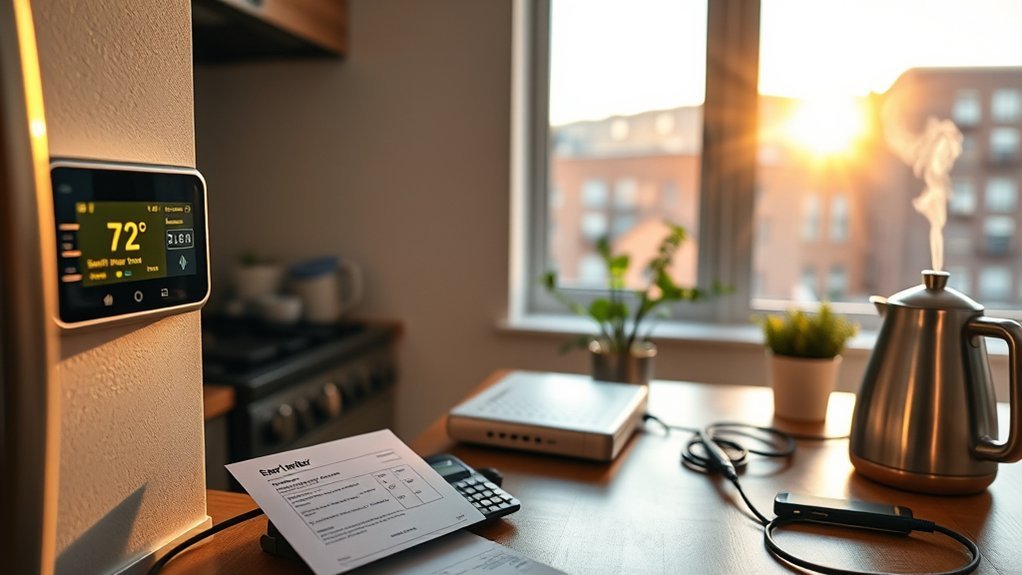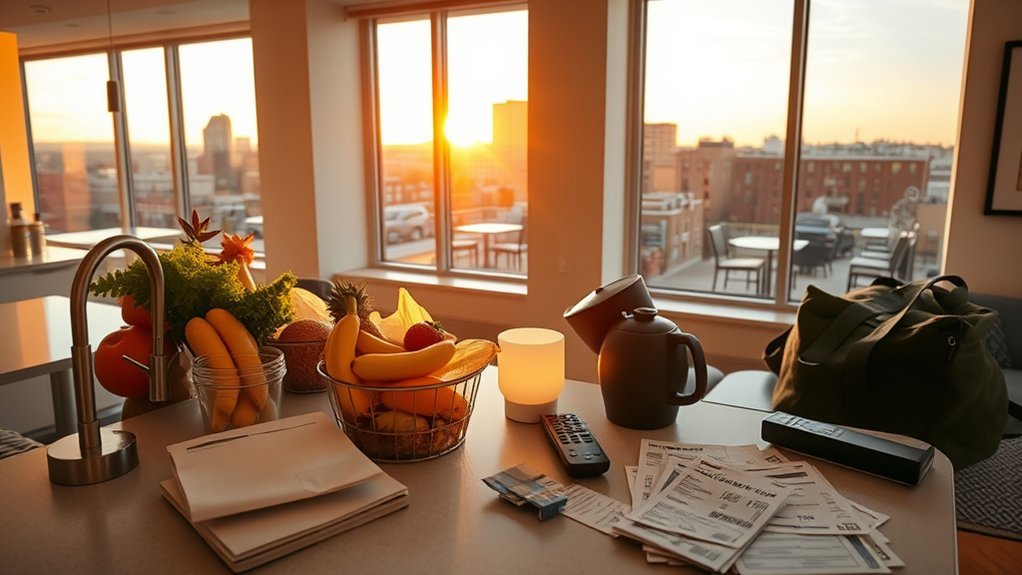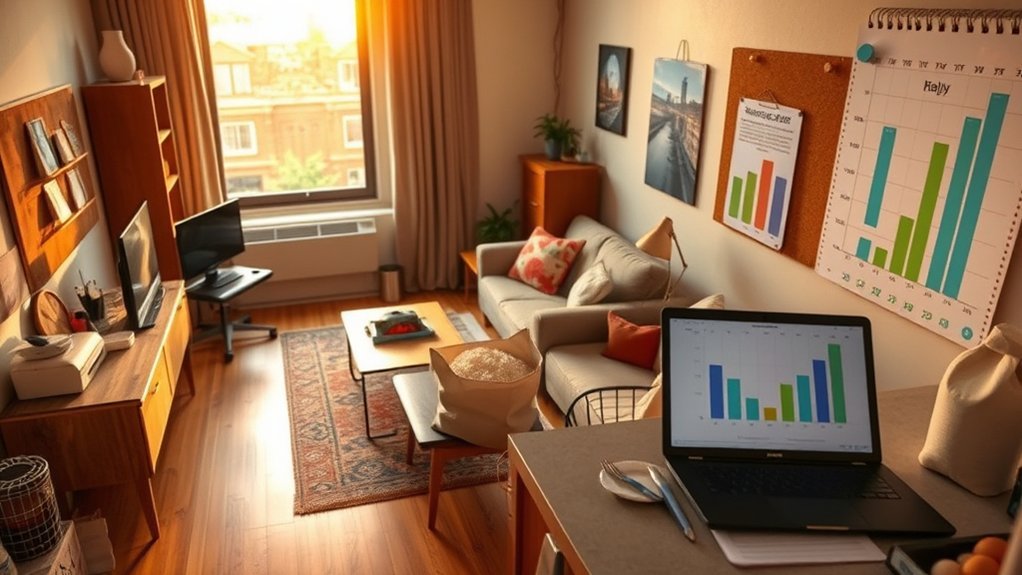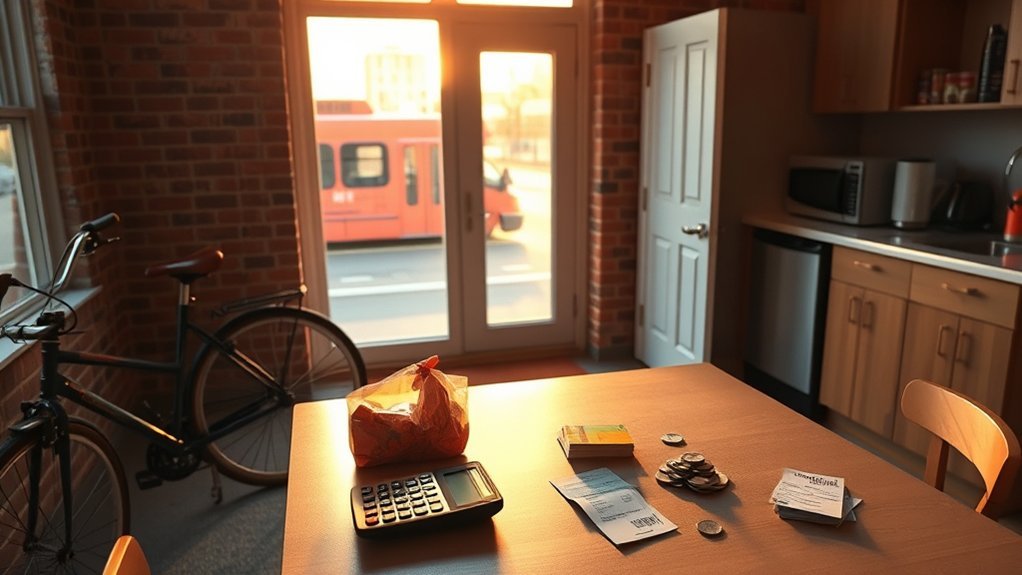You’ll need roughly $3,600–$4,300 a month to cover typical living costs in Winston‑Salem, depending on whether you rent or own. Expect one‑bedroom rents near $1,100, two‑bedrooms about $1,230, and owner costs closer to $1,728 monthly; utilities, phone and energy add ~$400–$450, groceries run about $600–$1,300, and healthcare and transport raise totals modestly. Aim for a $52k–$54k salary for comfortable single‑adult living, and keep going to see detailed line‑item guidance.
Housing Costs: Rent, Home Prices, and Mortgage Expectations

While Winston‑Salem’s housing market stays more affordable than many U.S. cities, you’ll still see a range: typical one‑bedroom rents run about $1,086–$1,102, two‑bedrooms about $1,230–$1,239, median rents for houses near $1,500, and studios around $930, while median home listings cluster around $382,000–$384,000 (some sources report lower medians near $260,000).
You’ll find average monthly rent figures reported between $1,097–$1,296 depending on the source, and three‑bedroom averages near $1,526.
If you’re buying, the median home price near $383,928 and prevailing rates around 6.90% mean mortgage payments vary substantially with down payment and term.
Estimate your monthly housing cost against recommended local income — roughly $52,000–$54,000 for a comfortable single‑adult budget.
Renters and owners report similar monthly housing outlays in some summaries (~$1,712 vs ~$1,728), so housing in Winston‑Salem remains the largest household expense despite overall lower cost of living. Additionally, understanding construction costs is essential for prospective homeowners looking to build in the area.
Monthly Utilities and Telecommunications Expenses

Expect to pay roughly $210–$230 monthly for energy and heating, with phone and telecom bills adding about $189–$217 depending on plans.
Combined, energy plus phone commonly totals around $400–$450 per month, and overall utilities (including water and internet) are about on par with or up to ~2% higher than the U.S. average.
Whether you rent or own, these utility costs are recurring and should be built into your monthly household budget. Additionally, regular maintenance tips can help you manage these expenses more efficiently.
Energy and Heating Costs
If you’re budgeting for utilities in Winston‑Salem, plan on average monthly energy costs around $215 (sources range $211–$230) and phone/telecommunications running roughly $189–$217.
You should treat that $215 as a baseline monthly cost for energy and expect higher heating bills in winter; local reports warn seasonal spikes above the average are common.
Overall utilities sit at or slightly above national levels, so include a small buffer in your budget.
- Track monthly energy use: monitor thermostat settings and insulation to manage the biggest variable in your utilities bill.
- Anticipate heating spikes: add 10–30% to the average during cold months depending on your home and heating system.
- Include utilities in total living-cost estimates for renters and homeowners alike.
Phone and Internet
Budget for phone and internet at roughly $190–$220 per month in Winston‑Salem, with common reported figures around $189.30 and $217.19 depending on plan and provider.
When you build a monthly budget, treat telecommunications as a recurring essential: phone and internet commonly combine with energy to form core utilities.
Local summaries often estimate combined basic utilities near $400–$450 monthly, so expect monthly phone costs to be a significant share.
Overall utilities here run at or slightly above national averages (reports show 0.1%–11% higher depending on data).
To plan precisely, compare providers for bundle deals, check data caps and speeds, and factor in any equipment or installation fees so your projected monthly utilities align with actual bills.
Utility Bills for Renters
You’ve already set aside roughly $190–$220/month for phone and internet; add energy to get a fuller picture of what renters pay each month. Expect total utilities (energy + phone/telecom) around $404–$430 monthly, with energy costs about $214–$230 and phone/telecom $189–$217. That’s at or slightly above U.S. averages, so plan a bit higher.
- Combine average rent in Winston-Salem (one‑bedroom ~$1,086) with energy and phone to estimate housing + utilities.
- Check leases: landlord‑included utilities can eliminate the ~$200+ energy/communications burden and change affordability calculations.
- For budgeting, treat utilities as predictable monthly obligations and track seasonal energy swings to avoid surprises.
Grocery and Food Budget Breakdown

Although groceries in Winston‑Salem run about 3% cheaper than the U.S. average, you’ll still want to plan monthly spending carefully: a single renter typically spends about $672/month (~$8,064/year), homeowners average closer to $1,333/month, and families with young children report $1,306–$1,522/month depending on household size. You’ll find staples priced predictably: bread ~$3.90, milk ~$4.60 per gallon, eggs ~$3.19–$3.52 per dozen, steak ~$15.50, ground beef ~$7.00, potatoes $5.03, lettuce $1.87, bananas $0.73 each. Packaged items — frozen meals ~$3.33, chips ~$3.93, soda ~$2.63, coffee ~$5.15 — keep convenience costs modest. Regular preventative measures can also help minimize unexpected costs in your budget. Use this data to set a realistic groceries line in your Cost of Living budget and track per month spending against the local average cost.
| Item type | Typical price |
|---|---|
| Staples (bread/milk/eggs) | $3.90–$4.64 |
| Meat/produce | $0.73–$15.50 |
Healthcare and Personal Care Costs

When comparing local care to national averages, expect medical expenses in Winston‑Salem to run a bit higher: a typical doctor visit costs about $152.89–$160.09 (6–10% above the U.S. average), dental visits are roughly $120.67–$125.24, and an optometrist visit averages $139–$149.63 (as much as ~14% above nationwide), while common OTC and prescription meds generally fall in the $11.09 and $21.92–$25.14 ranges respectively—figures you should fold into monthly healthcare lines that, depending on household type, tend to average about $152/month for renters and roughly $430/month for homeowner scenarios.
- Account for routine appointments: budget for higher-than-average doctor, dental, and optometry fees when planning your Cost of Living and emergency medical cushions.
- Factor prescription and OTC spend: regular meds and basic personal care add predictable, recurring costs to your home budget.
- Compare insurance vs. out-of-pocket: evaluate plans against local price points to minimize surprise bills and keep healthcare on your monthly radar.
Additionally, consider that common causes of exhaust leaks can lead to unexpected vehicle repair costs that may impact your overall budget.
Transportation and Commuting Expenses

Get a quick read on commuting costs: driving in Winston‑Salem is a bit cheaper than the U.S. average, with gas running about $3.07–$3.15 per gallon (roughly 4–5% below national prices) and overall transportation expenses about 7–8% lower than the countrywide norm. You’ll find Transportation costs favorable whether you drive or use transit. Gasoline savings shave monthly fuel budgets, and routine vehicle work like a tire balance averages $53–$54 — roughly 15% below national service prices.
If you commute by bus, WSTA offers affordable routes that cover main corridors, letting you reduce fuel and parking costs. Short trips can be practical by bike thanks to expanding bike lanes. Additionally, it’s important to consider routine maintenance to keep your vehicle in optimal condition and potentially lower long-term transportation expenses.
For families, expect Transportation costs about 7.9% below the national family average; factor that alongside higher local healthcare when planning household budgets. Use these figures to estimate monthly commuting line items and decide whether driving, transit, or mixed modes fit your routine and wallet.
Goods, Services, and Entertainment Spending

Look over your discretionary budget and you’ll see goods, services, and entertainment costs in Winston‑Salem sit effectively even with the U.S. average—about 0.1% difference—so typical monthly spending runs near $1,067 for renters and $2,675 for homeowners.
Discretionary costs in Winston‑Salem mirror the U.S. average — about $1,067 monthly for renters, $2,675 for homeowners.
You’ll find the cost of groceries aligns with national levels, and consumer goods like clothing are comparable — men’s shirts ~$38.49, women’s slacks ~$39.07.
Entertainment is affordable: movie tickets about $11.03–$11.46 and yoga classes roughly $20.07 per session.
Personal care varies: haircuts ~$23.95, beauty salon services ~$50.94, dry cleaning ~$16.39 per item.
Small appliance or service repairs (washer ~$107.13) can nudge discretionary totals higher. Additionally, understanding how to track routine goods can help you maintain better control over your monthly expenses.
- Track routine goods & services to keep monthly averages steady.
- Plan entertainment by frequency (movies, classes) to control spend.
- Budget personal care and occasional repairs as separate line items.
These data-driven actions help you manage discretionary spending, since choices — not local price gaps — drive most variation in your monthly budget.
Income Benchmarks and Recommended Budgets

Although Winston‑Salem’s overall cost of living is about 7–9% below the national average, you’ll want an annual income near $52,044 to live comfortably as a single adult (about $4,337/month in basic expenses), while the median household income sits around $70,825—numbers that help you gauge housing and budget targets.
Use the recommended annual salary as a baseline: single-adult needs align with $52k, while buyers should target higher incomes given owner housing costs near $1,728/month and monthly homeowner basics averaging about $7,763.
Follow the 30% rule: with average rents of $1,097–$1,299, you’d need roughly $43,880–$51,960 gross to keep rent affordable.
Families face different totals—monthly basics range $7,088–$8,155—so adjust accordingly.
Also factor healthcare, which runs about 6% above national levels, into your discretionary calculations.
Build budgets that prioritize housing, medical, groceries, and utilities, then allocate remaining income to savings and entertainment. Additionally, understanding the initial startup costs involved in group home operations can help you plan for potential expenses if you’re considering starting one in the area.
Frequently Asked Questions
What Is the Average Cost of Living in Winston-Salem?
You’ll pay roughly 7–7.5% less than the U.S. average; expect monthly costs near $4,300 with rent ~$1,100–1,300, grocery prices slightly cheaper, utility bills modestly higher, healthcare access pricier, and limited public transportation.
What Salary Do You Need to Live in Winston-Salem, NC?
You’ll need about $52,000–$70,000 yearly to live comfortably; aim higher if you value career growth, nightlife options, or homeownership. Factor commute costs, healthcare access, taxes, and savings to cover essentials and build security.
What Salary Do You Need to Live Comfortably in NC?
You’ll need roughly $52k–$65k annually to live comfortably in NC, depending on housing affordability, commute times, tax implications, and healthcare access; adjust higher for families or longer commutes and better insurance coverage.
Is Winston-Salem a Cheap Place to Live?
Yes — think of finding a spacious apartment for less than you expected; you’ll enjoy neighborhood vibes, shorter commute times, affordable local cuisine and lively community events, though healthcare and some utilities may slightly raise costs.
Conclusion
You’ve seen the numbers — rent ranges, utility averages, grocery totals, and transport costs — and you can already map your budget. But before you sign a lease or set a savings goal, pause: small choices compound fast. Decide which line items you’ll trim, which you’ll prioritize, and where a modest trade-off now opens up stability later. Do that, and Winston‑Salem’s costs stop being a constraint and start becoming your plan.


